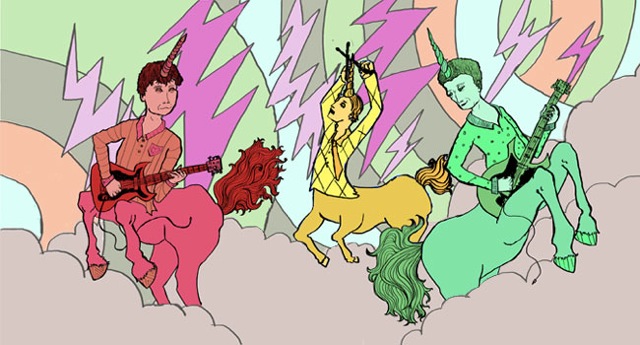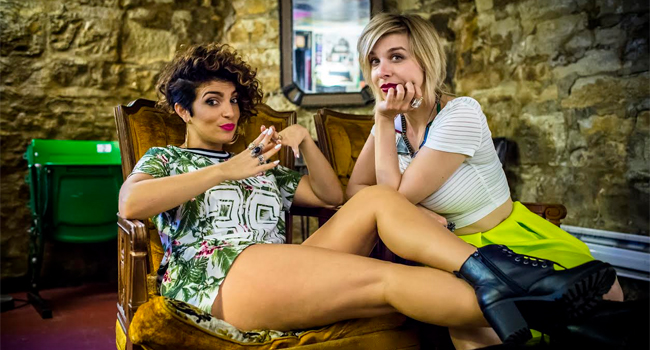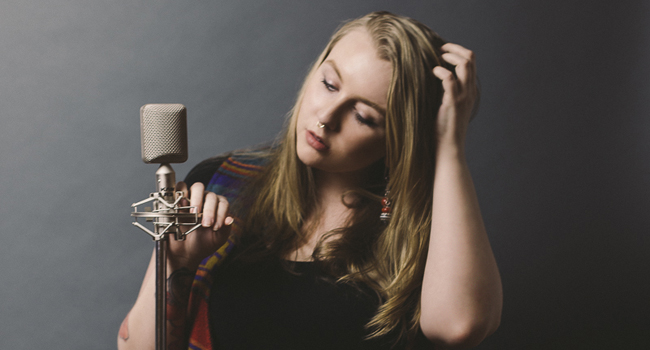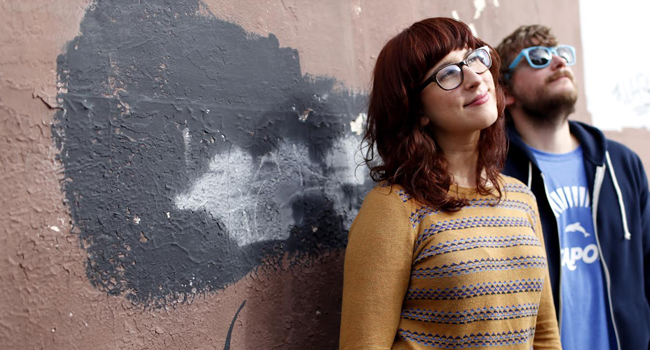When a band has been broken up for years, fans always fantasize about possible reunions—a chance to hear brand new material or see the live show they might have missed when the band was still active. Band reunions are a lot like the cancelled TV show rumored to one day be made into a movie: As a fan, you can only hear about the possibility for so long before you give up all hope—that is, until all the cast members officially sign on.
 Luckily for fans of Montreal-based band The Unicorns, the indie-pop trio known for its bouncy songs and whimsical lyrics about ghosts, jellybones, and unicorns, the band’s long-rumored reunion is finally here. Ten years after its breakup in 2004, the band recently announced a six-show reunion tour with Arcade Fire and a re-mastered reissue of its last full album, Who Will Cut Our Hair When We’re Gone? with four extra tracks. The album, which is already available as a digital download, will be released on CD Aug. 26 and on limited-edition vinyl Oct. 7.
Luckily for fans of Montreal-based band The Unicorns, the indie-pop trio known for its bouncy songs and whimsical lyrics about ghosts, jellybones, and unicorns, the band’s long-rumored reunion is finally here. Ten years after its breakup in 2004, the band recently announced a six-show reunion tour with Arcade Fire and a re-mastered reissue of its last full album, Who Will Cut Our Hair When We’re Gone? with four extra tracks. The album, which is already available as a digital download, will be released on CD Aug. 26 and on limited-edition vinyl Oct. 7.
The individual unicorns—Nick Thorburn, Alden Penner, and Jamie Thompson—have been far from quiet on their own in the last decade. Thorbun formed Islands (with Thompson on drums) and played in Mister Heavenly and Human Highway. Penner has released solo work and played in the bands Clues and Hidden Words. But it’s been years since the three have played together as The Unicorns or released any new material.
Pop ’stache spoke with Penner over the phone (shortly after the band played its first two reunion shows in Los Angeles) about how the long-rumored reunion finally came together, practicing old songs for new shows, and the future of The Unicorns.
Pop ’stache: So you just played the first two shows of the tour, right?
Alden Penner: Yeah. It was immense. It was an amazing, amazing thing. I’m still trying to get some perspective on it, honestly. It was one of those things that was just kind of unbelievable until it actually happened, and once it happened it felt like, “Oh, so that was it.” It wasn’t the most insane performance we’ve ever done or anything. It was more about the significance and the momentousness of it, for personal and communal reasons. It seemed like a much bigger deal than it actually was.
I suppose that’s true of many things—it’s more about how much meaning we choose to invest with our minds and hearts that makes it so.
P ’s: How did it feel to engage with the audience at those shows?
AP: I felt like there was a lot of goodwill and everything. We’ve always tried to connect with one another in spite of how the audience is responding. I think in a large stadium [at The Forum in Inglewood, Calif.], it can be harder to connect. I almost feel like you have to make a caricature of your normal performance, exaggerate all of your movements and everything, to be able to communicate to the people furthest back—when you’re on stage, you’re small.
But I felt that everyone who wanted to be there and who was really excited about the band wanted to get a good spot—it seemed like everyone was genuinely fascinated.
I thought it was really great, and I wish I’d gotten to actually interact with people a bit more after the shows, but I just wasn’t sure where people would be gathered and stuff, and it was a little bit overwhelming, the size of the venue.
P ’s: So I know it’s been talked about for years, but how did the reunion finally come together?
AP: We talked about it last year because that was the 10-year anniversary of our album, but there’s no CEO or board of directors of The Unicorns directing things. So that initial idea fell by the wayside because we’ve been busy with other things, but it was still in the air. Of course, 2014 is another important year for us because 2003 and 2004 were the two years we were the most active as a band, and also in terms of our theme song, “2014,” and our last EP with the same name. There were some questions around, “Why should we do this with Arcade Fire? Why can’t we do this on our own?” But I don’t think we would have done this tour with Arcade Fire if we hadn’t had the shared history with them, touring together in 2004 as well. Everything has a parallel with 10 years ago.
It took a while to do because whether we acknowledge it all the time or not, the band has been something really impactful in our lives and really special to us, and we are all trying to be really careful about how we do things.
We don’t want to exceed the bounds of modesty in terms of making this a full-on commercial project at the moment. A lot of reunions come together as an attempt to fully exploit something that really isn’t relevant anymore, but I think this is quite relevant, at least to us, and to some of the fans out there, and sharing some unheard music of ours that we’ve had out in the archives for a while.
Ultimately it was Win [Butler of Arcade Fire] stepping in and saying, “Okay, are you guys going to do this or not?”
He made it concrete because he had the infrastructure and the shows available that we didn’t. We didn’t have anything besides ourselves. Win was able to provide that very crucial missing piece in offering us these shows.
I think for The Unicorns, it has to be a practice in actually playing, or else it just seems abstract. We need a show to practice for. It’s not the other way around—you don’t practice until you’re good enough for the show, you have to book the show, and then practice for that. So that was what made it happen.
P ’s: And did you guys feel like you needed a lot of practice to get comfortable with those songs again? What was that like?
AP: Jamie and I had played over the years, and Jamie and Nick had played, but I don’t think Nick and I had played in a good while. That was the main thing we’ve been trying to work through. I had been playing some of these songs and practicing them even before we came together, rehearsing different parts, relearning them, learning new parts that I didn’t play back then for the live show. And besides the fact that I hadn’t been playing as regularly on those particular instruments, it was all pretty natural.
When we got together, it was almost uneventful in terms of how easily it came together.
We had to practice several songs, but that was part of the renewing of our friendship, getting to teach each other parts, and then listen to the recordings to see, “Oh, that’s what we were doing.” But because we’ve had all this experience as musicians, it’s definitely not the same as it was 10 years ago. I mean technically, I don’t think we’re even the same cell composition anymore as we would have been at that time. We’re not awesome musicians, but we’re definitely playing the songs better than we ever have, or our former cells have.
P ’s: And to play these songs again that you wrote in your early 20s, now that you’re in your early 30s—there must be such a tremendous difference in terms of where you are in your life as a person and a musician.
AP: Yeah, it’s a great kind of gift, actually, because I think most people don’t get to account for that period of life in any formal way, that time after formal education when you’re supposed to be working and doing all this “real life” stuff. For me, I get to cap this with looking back on those 10 years and say, “Oh okay, I did all these things.” That was definitely a very crucial time for me, in my 20s. At the time it was all being made, it was all being created, it was all new. It was a big discovery for ourselves and for others to see what was inside of our band and our artistic selves.
I definitely feel this is a new phase in my life and I do feel relatively more mature, but—it’s interesting. I think, ideally, it would have been great if the band had continued through those years and done more things. But this is how it has worked out.
P ’s: Are there any plans for The Unicorns to release any new music in the future?
AP: Well, the way we made The Unicorns album is that we would send recordings back and forth to improve on one another’s songs. That happened over a year, and it takes some time to make things satisfactory, or beyond that, really awesome. So, that said, where we’re at right now, I don’t know if we can have any newly recorded material for some time unless it’s based on stuff that we’ve already worked through.
P ’s: Because it takes so much time?
AP: Yeah. There are ways of condensing that, obviously. The whole idea of being in a studio with concentrated time is that you’re working through that, without any intellectual considerations, and trying to capture the emotional quality of a song, trying to make that seem natural in a very laboratory-like place. You’re trying to flip the capabilities of the studio, in a way, to be able to produce something very human, in a very scientific way, in a scientific environment. So what I’m saying is that we need that. We need either that concentrated time or enough time to see what we can improve on, if we were to rerecord, or add stuff to anything from the archives. What we put on our recent reissue are just old recordings that have been polished up a bit, and there are others of that caliber in that category we can work through as well. That’s probably the most likely thing, if we were to put anything out there right now.
P ‘s: How has the reunion been for you and the guys in the band, just in terms of reuniting as friends and hanging out again?
AP: I think it’s been good. We’ve changed a bit, and that span of time between your early 20s and early 30s can bring a lot of change in terms of the kind of lifestyle you want to have, and that’s definitely happened with me. Being in a rock band doesn’t open up the kind of social spaces that I necessarily want to be a part of. But with Nick and I having started this band in high school, that’s a unique thing, in terms of our friendship. It has an interesting dynamic, but we’re still very different people. I wouldn’t say there’s no love there or anything, it’s just that we live in different places and we do different things.
This hasn’t necessarily been about having a heart-to-heart, awesome, personal reunion.
That’s part of it, sure, but the way we celebrate that is through playing and preparing to play music, because that’s been forged into our lives.
Over the past 10 years, we’ve attempted to do things otherwise, where we go about the reconciliation verbally, or through writing. Writing is kind of how our relationship began, with Nick and I. We liked each other as friends, but we were kind of shy about revealing our feelings to each other, so we actually had a correspondence for some time. That just really helped in smoothing over some of our misunderstandings, and band jealousies, and this madness.
But now I think that we want to make this band work, at least for the immediate future, so there’s not really a whole lot to stumble on. We’ve done all of the hard labor, and now it’s time to harvest all of the fruit.
P ’s: It’s probably easier too now that you’re not in high school—without all the emotions and tensions that can run high when you’re that age.
AP: Yeah. But we kind of built a band around that, in a way. The quality of the band was kind of bringing out those things.
I think that’s the virtue of art. You can put things at a distance from what you’re immediately feeling intensely, and put that in amber, in a way.
It would be interesting to hear what kind of music we’d make together now, if it would be trying to draw on our present view of that time of life. The playfulness, the excitement of that time, too, is something a lot of people want to recapture somehow as they get older. There’s a certain nostalgia involved with it. For me and Nick, we almost feel that instantaneously when we’re about to play together. Us working together creates something—a product that’s different from what we make working on our own, a certain kind of playfulness, mischief, that’s kind of cool.
The Unicorns will be playing three reunion shows at the Barclays Center in Brooklyn, New York on Aug. 22, 23, and 24 with Arcade Fire and Dan Deacon. They will also headline at the POP Montreal music festival in Montreal, Canada on Sept. 21.



